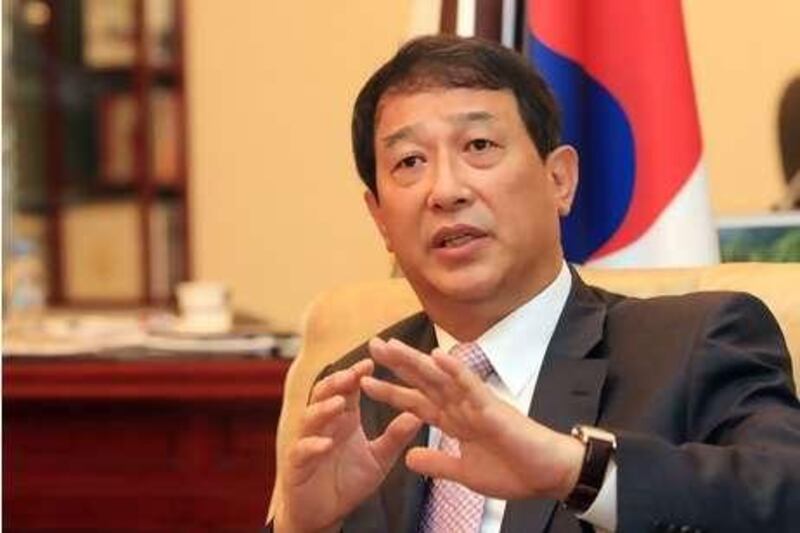South Korean clean-energy companies are expected to play a major role in filling Masdar City, the carbon-neutral development at the edge of the capital, but they need better incentives to get on board, the new Korean ambassador said yesterday. Plans call for a Korean "clean-tech cluster" to occupy 7 per cent of the Masdar City site, said Kwon Tae-kyun, South Korea's ambassador to the UAE. That would be a significant proportion of the six-square-km city, which is weeks away from completion of a first stage comprising several buildings and a transport network.
"You have to think in the minds of potential investors. You have to induce.You cannot just ask them to come," said Mr Kwon, who took up his post last month. "We have to study first what kinds of incentives, what kinds of facilities can be given - and how much can be invested directly by the two sides. "So if the UAE Government puts some money in, we can also put money there." Masdar and South Korea's ministry of knowledge economy signed an agreement at the end of December to explore the establishment of a Korean clean-tech cluster at Masdar City and co-operate in other areas of renewable energy. The agreement was announced immediately after the Abu Dhabi Government chose a consortium of South Korean companies to build the UAE's first nuclear reactors.
Lee Myung-bak, the South Korean president, has made investments in clean energy and "green growth" a centrepiece of his political agenda, but Korean firms have yet to develop indigenous clean-energy technologies to the same levels they have attained in nuclear energy, ship building and other highly productive sectors of the economy. Masdar and the Korean government are studying the idea of creating a "techno park" at Masdar City in which the governments would fund the construction of office space and research facilities, and potentially provide additional incentives, Mr Kwon said. South Korea has 13 such parks in operation serving small and medium-size companies that lack the capital to build their own campuses, Mr Kwon said.
Masdar has just signed an agreement with the Korean Technopark Association to study the concept for up to one year, he said. "We cannot rush. We are dealing with private companies," he said. "So if you give money, it's the quickest way. If I give you money, you come here, but otherwise we have to think first. That is the advice from our side." With such incentives and help from Masdar or the Abu Dhabi Government, the Korean cluster at Masdar City would differ substantially from a smaller "Swiss Village" that would be designed and built there by Swiss companies and the Swiss government.
In the village, which would include the Swiss embassy, "everything is 'Made in Switzerland' - designed by Swiss architects and designers, built by Swiss companies to Swiss quality", the village's website says. Masdar City will be a free zone, meaning that most types of companies will be able to do business without the need for Emirati partnership. Masdar officials have noted in the past, however, that the provisions of the free zone are still being clarified.
Loosening joint-venture requirements across the country could go a long way towards attracting more South Korean companies to the UAE and deepening bilateral ties between the two countries, Mr Kwon said. "If they're invited to open a little representative office, it's best if they just have to send one person. They can operate it at very little cost," he said. "But if they are requested to form a joint venture, they will have to think a lot, they will have to calculate."
The Federal Government is expected to relax existing rules on foreign ownership. Once approved by the Cabinet, the final draft of the law will require the endorsement of the Federal National Council. The law would overturn rules banning foreign ownership outside of free zones, but the opening up would most likely be limited to specific sectors of the economy. cstanton@thenational.ae





